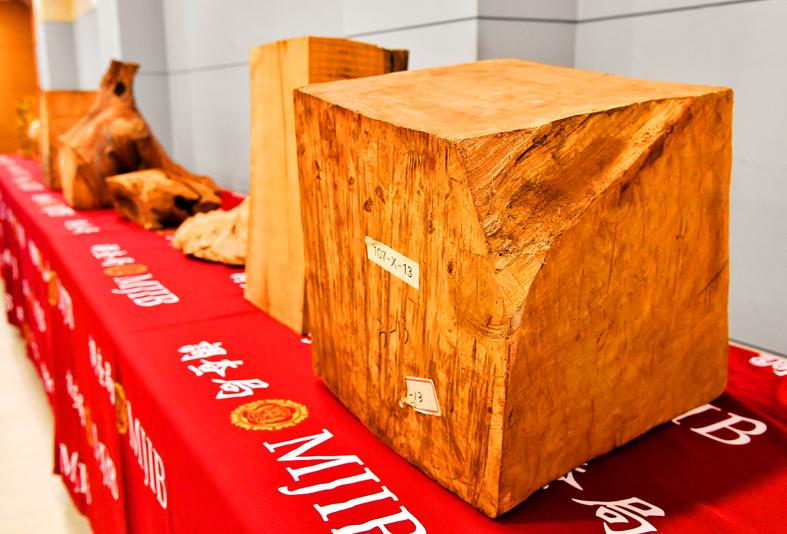To help protect the nation’s forests and guard against illegal logging, the government has established a DNA database for Taiwan cypress and Taiwan cedar trees, Minister of Justice Tsai Ching-hsiang (蔡清祥) said at a news briefing in Taipei yesterday.
The database would enable authorities to identify a particular species, and facilitate prosecution and conviction of illegal logging activities, Tsai said at the Ministry of Justice’s Investigation Bureau (MJIB) office.
The project is the product of a four-year collaboration between the MJIB, the Forestry Bureau and Academia Sinica’s Biodiversity Research Center, he added.

Photo: CNA
“In the past, ‘mountain rats,’ when caught, always claimed that they had only cut down ordinary trees, and not a protected species. Now we can make a positive identification through the database to rebut their claims and bring them to justice,” Tsai said.
A “mountain rat” refers to an individual or group engaged in illegal logging for profit.
“It is not easy to find these mountain rats, as they lurk in remote locations, in difficult terrains in the mountains. Law-enforcement agents cannot spend long periods to track them down,” MJIB Director-General Leu Wen-jong (呂文忠) said.
“It is important to protect Taiwan’s unique species of cypress, cedar and other valuable hardwood trees, and we need science and technology to help us identify materials seized at the crime scene, present this evidence in court and prosecute the offenders,” Leu added.
The project was started in 2017, with extensive work by Forestry Bureau field teams, collecting 600 tree samples in the mountains, focusing on Taiwan cypress and Taiwan cedar, which are classified as protected species under the Forestry Act (森林法), Leu said.
“It is like compiling a fingerprint database for these protected trees and giving them an identification card. The work is ongoing, with more DNA samples being added in the coming years to boost the database’s accuracy in DNA matching,” he added.
Pointing to wood samples confiscated from “mountain rats” during MJIB raids, officials said that DNA genomes from hardy plants have good preservation property.
DNA extracted from driftwood, dead trees cut down many years ago and decomposing trees can be used for identification, and even pinpoint the original location of the tree, they said.
“We will be able to tell then where the illegal logging took place, verify the location and present the evidence in court to get a conviction. This can help us to crack down on these criminal groups, safeguard Taiwan’s forests and protect the environment,” Leu said.

Alain Robert, known as the "French Spider-Man," praised Alex Honnold as exceptionally well-prepared after the US climber completed a free solo ascent of Taipei 101 yesterday. Robert said Honnold's ascent of the 508m-tall skyscraper in just more than one-and-a-half hours without using safety ropes or equipment was a remarkable achievement. "This is my life," he said in an interview conducted in French, adding that he liked the feeling of being "on the edge of danger." The 63-year-old Frenchman climbed Taipei 101 using ropes in December 2004, taking about four hours to reach the top. On a one-to-10 scale of difficulty, Robert said Taipei 101

Nipah virus infection is to be officially listed as a category 5 notifiable infectious disease in Taiwan in March, while clinical treatment guidelines are being formulated, the Centers for Disease Control (CDC) said yesterday. With Nipah infections being reported in other countries and considering its relatively high fatality rate, the centers on Jan. 16 announced that it would be listed as a notifiable infectious disease to bolster the nation’s systematic early warning system and increase public awareness, the CDC said. Bangladesh reported four fatal cases last year in separate districts, with three linked to raw date palm sap consumption, CDC Epidemic Intelligence

Two Taiwanese prosecutors were questioned by Chinese security personnel at their hotel during a trip to China’s Henan Province this month, the Mainland Affairs Council (MAC) said yesterday. The officers had personal information on the prosecutors, including “when they were assigned to their posts, their work locations and job titles,” MAC Deputy Minister and spokesman Liang Wen-chieh (梁文傑) said. On top of asking about their agencies and positions, the officers also questioned the prosecutors about the Cross-Strait Joint Crime-Fighting and Judicial Mutual Assistance Agreement, a pact that serves as the framework for Taiwan-China cooperation on combating crime and providing judicial assistance, Liang

US climber Alex Honnold left Taiwan this morning a day after completing a free-solo ascent of Taipei 101, a feat that drew cheers from onlookers and gained widespread international attention. Honnold yesterday scaled the 101-story skyscraper without a rope or safety harness. The climb — the highest urban free-solo ascent ever attempted — took just more than 90 minutes and was streamed live on Netflix. It was covered by major international news outlets including CNN, the New York Times, the Guardian and the Wall Street Journal. As Honnold prepared to leave Taiwan today, he attracted a crowd when he and his wife, Sanni,